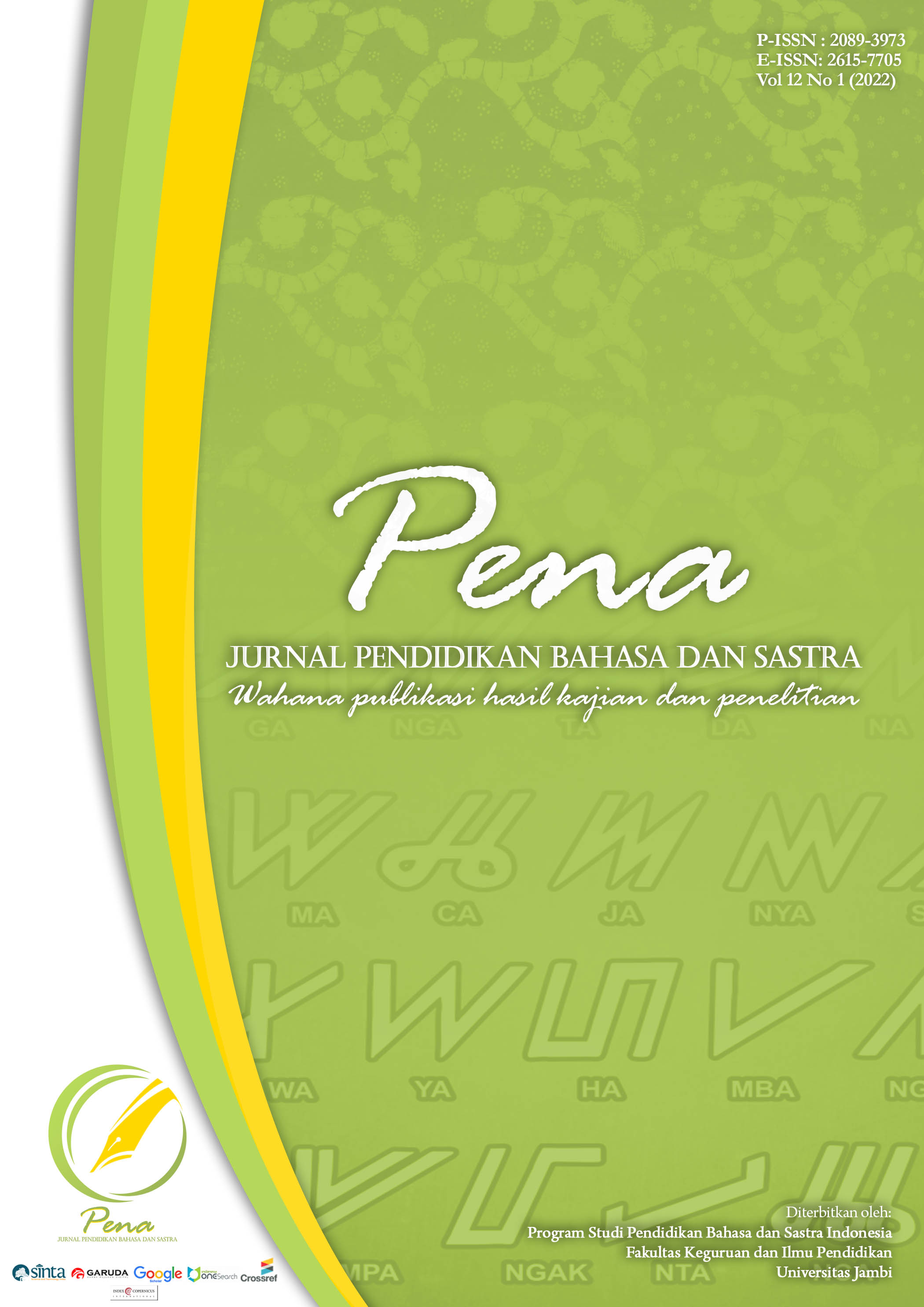Penerapan Model Pembelajaran Berbasis Proyek untuk Meningkatkan Aktivitas dan Keterampilan Analisis Sastra
DOI:
https://doi.org/10.22437/pena.v13i1.29624Keywords:
Activity, Skill, Literature Analysis, PjBLAbstract
Abstract
The purpose of this study was to improve literary analysis activities and skills using a project-based learning model in the Indonesian Literature study program, Faculty of Teacher Training and Education, Jambi University. The method used in this research is Classroom Action Research (PTK) which was carried out in two cycles in the Oral Literature Study course. In the first cycle, two meetings were held and the second cycle was held three meetings. Each cycle is carried out in the stages of planning, implementation, observation, and reflection. The data were analyzed in accordance with the predetermined assessment rubric. In the first cycle, the students' activity scores increased, 80% of which reached the good category score and 20% reached the very good category score compared to the activity scores obtained in the pre-cycle. As for the value of the results of literary analysis in cycle I, it has not yet reached the target, namely not exceeding 50% of students getting good and very good category scores. In cycle II, the value of activity and the results of literary analysis experienced a significant increase, namely 100% of students getting very good category scores for activity scores and 80% of students getting good scores and 20% getting very good scores for the results of literary analysis. Based on these values, it can be said that the application of the Project Based Learning learning model in the Oral Literature Study course to improve activities and oral literature analysis skills is appropriate and effective to be applied.
Keywords: Activity, Skill, Literature Analysis, PjBL
Downloads
References
Abidin, Y. (2014). Desain Sistem Pembelajaran dalam Konteks Pembelajaran 2013. Bandung: Refika Aditama.
Bell, S. (2010). Project-Based Learning for the21st Century: Skills for the Future. The Clearing House, 83: 39–43, .Routledge, Taylor & Francis Group.
Joyce, B., Marsha, W. and Emily, C. (2009). Models of Teaching (Model-model Pengajaran Edisi Kedelapan). Yogyakarta : Pustaka Belajar.
Jusita, M.L. (2019). Implementasi Model Pembelajaran Berbasis Proyek (Project Based Learning) untuk Meningkatkan Aktivitas dan Hasil Belajar Siswa. Jurnal JTP2IPS (Jurnal Teori dan Praksis Pembelajaran IPS). Vol. 4, No. 2, Tahun 2019. DOI: 10.17977/um022v4i22019p090
Kemmis, S., & Mc Taggart, R. (2005). Participatory Action Research: Communicative Action and the Public Sphere.
Komalasari, K. (2011). Pembelajaran Kontekstual. Bandung: PT. Refika Aditama.
Nurfitriyanti, M. (2016). Model pembelajaran PBL terhadap kemampuan pemecahan masalah matematika. Jurnal Formatif. 6(2): 149-160. DOI: http://dx.doi.org/10.30998/formatif.v6i2.950
Nurjanah, T., & Esa, Y. M. (2019). Optimalisasi Hasil Belajar IPA Melalui Model Project Based Learning Jurnal Adat dan Budaya Vol. 1, No. 2, Tahun 2019, pp. 84-93 93 Pada Peserta Didik Kelas IV. Prosiding Seminar Nasional PGSD, 1, 59–65.
Presiden Republik Indonesia. (2012). Undang-Undang Republik Indonesia Nomor 12 Tahun 2012 Tentang Pendidikan Tinggi. Jakarta: Kementerian Hukum dan Hak Azasi Manusia Republik Indonesia.
Putra, H.D, & Purwasih, R. (2015). Meningkatkan Prestasi Belajar dan Keaktifan Mahasiswa Melalui Project Based Learning. Jurnal Ilmiah P2M STIKP Siliwangi. Vol. 2, No. 2, Tahun 2015. DOI: https://doi.org/10.22460/p2m.v2i2p128-136.156
The George Lucas Educational Foundation. (2005). Instructional Module Project Based Learning. Diunduh dari http://www.edutopia.org/modules/PBL/whatpbl.php
Wiriaatmaja, R. (2008). Metode Penelitian Tindakan Kelas. Jakarta: PT REmaja Rosdakarya.
Downloads
Published
How to Cite
Issue
Section
License
Copyright (c) 2023 Sovia Wulandari, Liza Septa Wilyanti

This work is licensed under a Creative Commons Attribution-NonCommercial-ShareAlike 4.0 International License.















